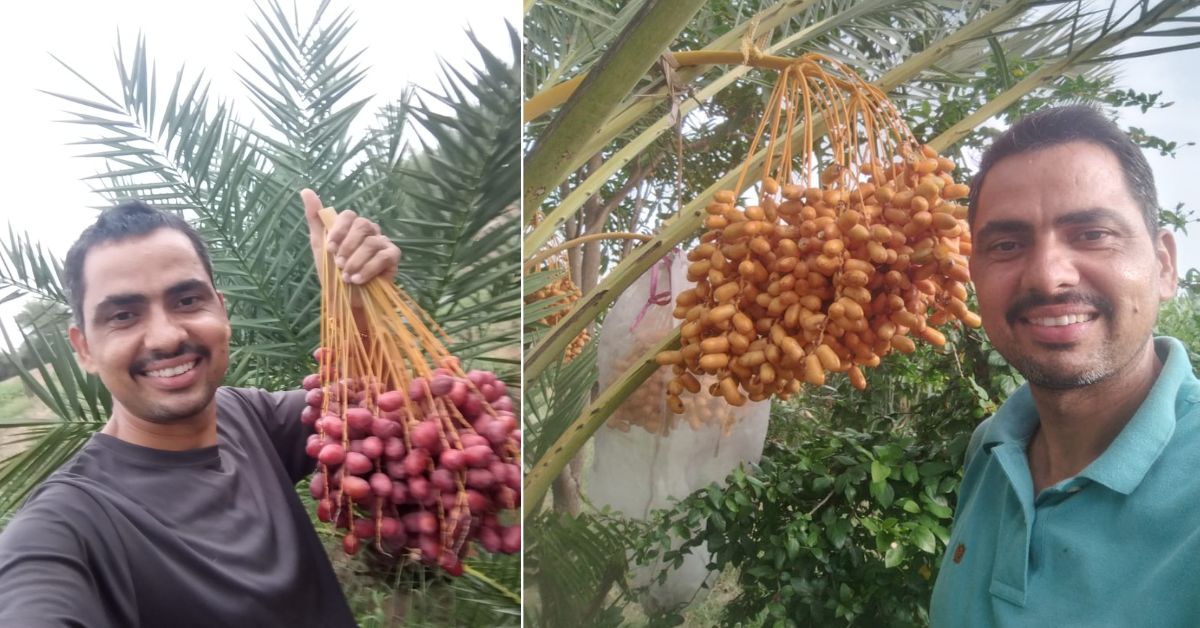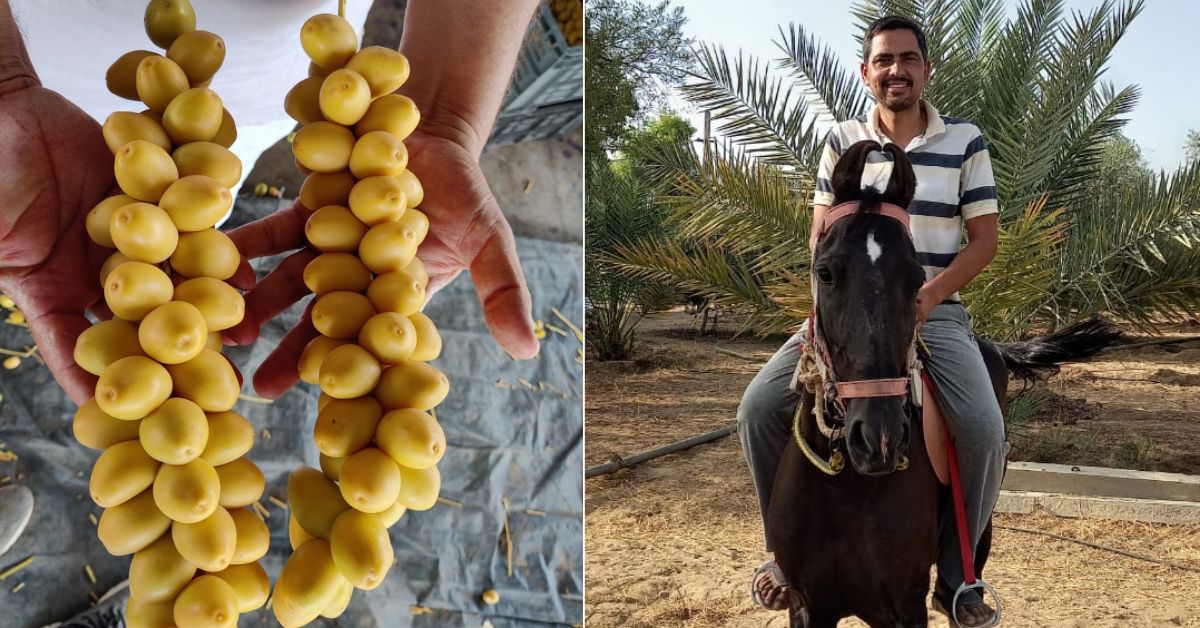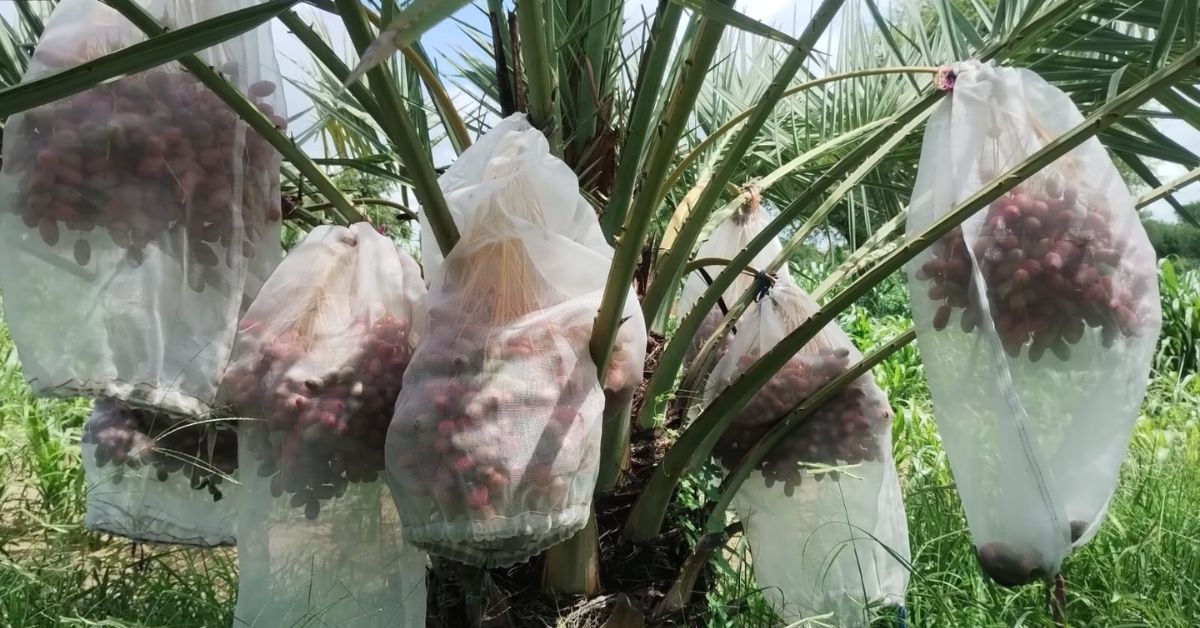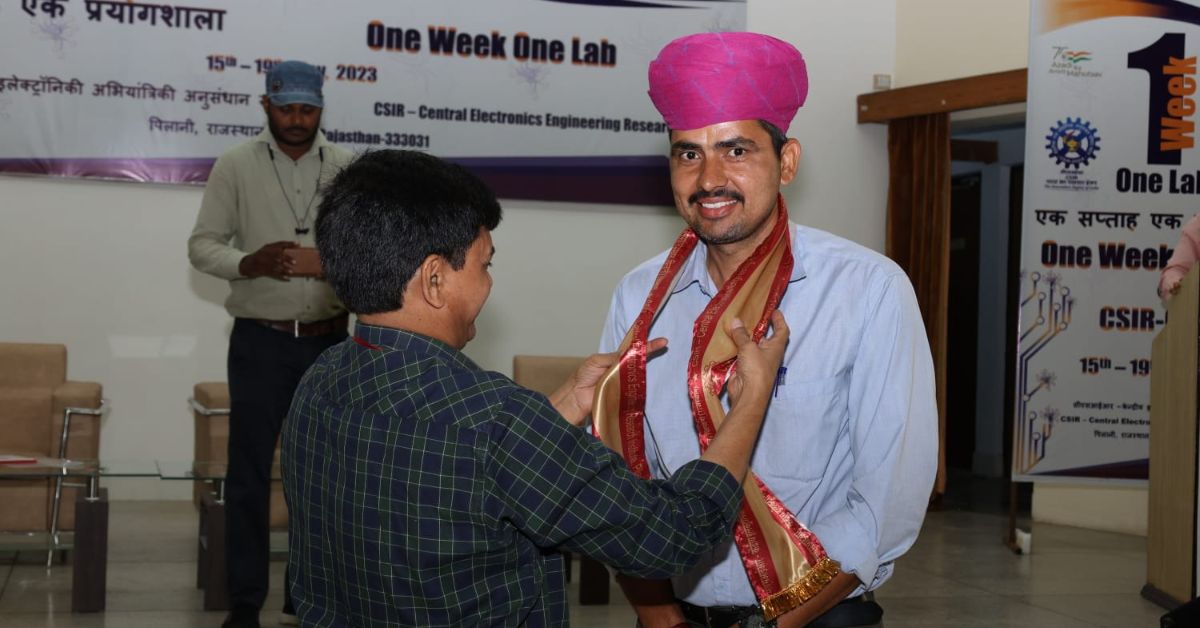Over the decades, India has cherished dates for its high source of nutrients. One of the most nutritious supplements to a diet, dates are packed with antioxidants and aid healthy bowel movement, even reducing the risk of cancer.
In fact, during Ramadan, khajoor or dates are used to break the fast that observers keep, thereby becoming a household staple.
But did you know that India’s date consumption requirements are met by other countries?
The largest exporters of dates to India are Iraq, the United Arab Emirates, and Pakistan. Data also suggests India imports 38 percent of the world’s production of date palm.

Nearly a decade back when Rajasthan’s Mukesh Maanjoo, a former National Security Guard (NSG), caught on to this fact, he was disheartened. “The climatic conditions of both Pakistan and India are the same, so why don’t we cultivate dates ourselves? We should lose some of the dependency on other countries,” he tells The Better India.
Believing this as his patriotic duty, he decided to cultivate dates in Pilani. Last season, Mukesh harvested five tonnes of organic dates which earned him a huge income of Rs 12 lakh. Here’s his story.
From commando to farmer
Before taking up date farming, Mukesh worked as a commando at the Indira Gandhi International Airport in New Delhi for 15 years. He specialised in counter-hijack operations to safeguard people. In 2018, he took voluntary retirement from the NSG services.
“As part of my work, I got an opportunity to visit 20 countries. On my way from the airports to hotels, I would spare some time to visit nearby farms and learn about their technologies,” he says.
“Agriculture is in my DNA,” he laughs, adding, “I have seen my father and grandfathers grow crops. But like them, I did not want to grow traditional crops like mustard, wheat, and grams. I wanted to try new technologies. Therefore, I was looking for crops that required less water to grow in our dry region of Rajasthan.”

While working as a commando, Mukesh had already started preparing himself to take up farming. But in 2018, he was forced to return to his village after his father was diagnosed with cancer. “Six months later, my father lost his life to the disease. His last advice to me was to take up date farming for a profitable farming business,” he recalls.
Later on, he undertook a 3-day training programme at the Centre of Excellence for Date Palm at Sagra-Bhojka in the Jaisalmer district. At that time, the state government was promoting date cultivation in Rajasthan by distributing subsidised date palm saplings to farmers.
Mukesh procured 250 date palm seeds of yellow-coloured Barhi and red-coloured Khuneji varieties and planted them on his farmland. It took four years before he saw the first fruit on the date palm.
‘I grow money on trees’
Mukesh points out that growing dates have been extremely fruitful as both Barhi and Khuneji varieties give high yields in low maintenance and have lower mortality rates as well.
“If you plant say 100 trees, then only 1-2 will die. The remaining trees will survive and continue to yield for 80 years. Besides, once the seeds are sown, we are only required to provide organic manures like cow and goat dung. Every year, I just add 150 kg of manure to one tree,” he says.

“Being sturdy, the date palms do not attract any pests and diseases, so there are hardly any input costs. All they require is water for irrigation, manure, and protection from birds, which can eat the fruit. So, I wrap a net around the date bunches,” he shares.
Apart from this, Mukesh mentions that dates require manual pollination. “The male and female species in date palms grow as separate trees. The males produce pollen from flowers and require manual pollination with females which bear fruits. For every 100 female plants, you need 4-6 male plants,” he adds.
After the flowering season in February, these fruit varieties ripen before monsoon and the produce is harvested by June-July annually.
Interestingly, Mukesh has also created a pond where he harvests up to 3 lakh litres of rainwater. “This rainwater is an elixir for our dates as it contains nutrients like nitrogen, phosphorus, potassium, and much more. This also helps me save 20-25 percent on irrigation in the dry region. Additionally, I use drip irrigation that takes water directly to the roots through pipes and minimises water wastage,” he says.
With date cultivation, he says any farmer can earn up to Rs 6 lakh per acre. “At least 60 date palms can be planted in an acre and up to Rs 10,000 can be earned from each tree. About 250 kg of fruits can be harvested from one tree,” says Mukesh, who has 250 date palms and earned Rs 12 lakh in the last season.

He sells all his produce to about 120 consumers based in Gurugram, Delhi, Noida, Chandigarh, and Jaipur.
In the past five years, he has received immense recognition at the state and district levels for growing dates organically. In 2018, he was felicitated for the promotion of indigenous breeds of cows for organic farming at the district level under the Agricultural Technology Management Agency (ATMA) scheme in 2019.
For his work on date farming, Rajasthan’s agriculture minister Lalchand Kataria presented him with an award in 2020, followed by the Chief Minister of Rajasthan Ashok Gehlot in 2021.
More than the recognition, Mukesh says he is blessed to lead a peaceful rural life on the farm. “I remember people would say, paisa ped me thode laagey hai (money doesn’t grow on trees). I wanted to prove this saying wrong. You can harvest money from trees if you follow the right farming methods and cultivate the right crops,” he smiles.
Source:
Plantation of Date Palms has changed fortune of farmers in Barmer: By Indian Council of Agricultural Research (ICAR).
Edited by Padmashree Pande. All photos: Mukesh Maanjoo.
No comments:
Post a Comment